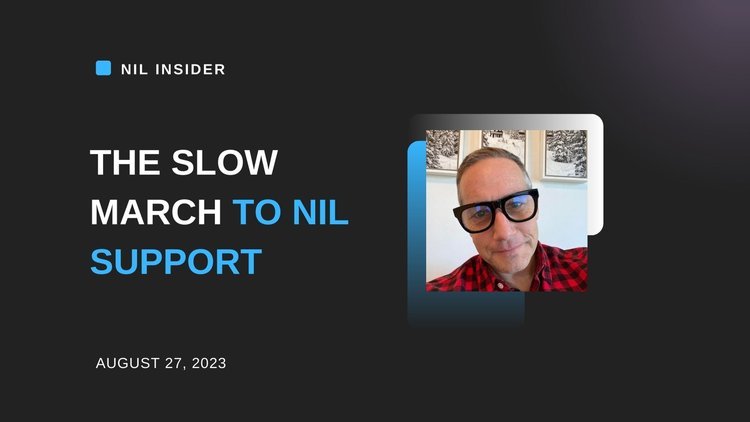The Slow March to NIL Support
Coaches and Athletic Administrators lag behind in their support of NIL.
NIL is overwhelmingly supported by student-athletes and college sports fans. Over 90% of student-athletes and over 70% of college fans support NIL rights for student-athletes.
Less than 2% of college athletes think NIL has diminished the experience of today's student-athletes. And only about 10% of college sports fans say that NIL has reduced their passion for college sports - most say it has had no impact. (Sportico and Harris recently did some research on this topic and had similar findings.)
But colleges and universities - including the coaches and athletic administrators that have participated in my surveys - lag far behind in their support of NIL. The exceptions to that statement have been coaches and AD's under 35 years old, female, or Black - all of whom are twice as likely to support NIL as compared to institutions overall.
Just like Uber and AirBNB
I compare the slowness of institutions to get on-board with NIL to the taxi industry during the advent of Uber and the hotel industry after AirBNB was launched.
Taxis and hotels are part of legacy industries. They are not accustomed to change, innovation, or competition.
At first, those industries denied that the threats by Uber and AirBNB were even real. “Who would ever get into a car driven by a total stranger? Who would ever pay to sleep at someone's home?"
When those industries finally realized that they had mis-read the public's appetite for doing exactly these things, they went into a defensive posture. They tried to defend their turf through the courts and court of public opinion.
But eventually, they lost. Then began the slow road to accepting their new reality.
Institutions are on much the same path with NIL. Decades of denial and then opposition eventually came to a head in the summer of 2021.
And now we are moving toward acceptance, but at a slow pace.
So why do 60% of institutional staff oppose NIL?
In a survey I did early in the Spring of 2023, I asked coaches and athletic administrators to tell me the primary reason that they do not support NIL.
13% of coaches and administrators think NIL will disrupt the leadership structure of their team. This is a point which was made by many prior to NIL being enacted. But after two years of NIL in practice, I can’t find any hard evidence that the traditional leadership model has been impacted by NIL.
I think there was great concern in the lead-up to NIL that coaches' authority might be threatened if or when student-athletes’ NIL earnings exceeded coaches’ salaries. As I’ve written about numerous times, NIL compensation for most student-athletes is akin to a part-time job and very few are making anything resembling a coach’s salary.
Next, 15% of coaches and administrators cite a change in tradition as the reason they don’t support NIL. I’m not sure what we can say about this one. Yes, they are right - NIL is a significant change. And I understand the fear - not all change is good and we will have to wait and see how all of this gets sorted out.
21% don’t support NIL because they believe that scholarships are compensation. Inferred here I think is that NIL money is not warranted. It’s worth noting that these are not entirely connected matters, since the institutions are not (yet) paying athletes directly for their NIL. Rather, institutions (and the NCAA, NAIA, and NJCAA) are merely permitting student-athletes to pursue income earning opportunities.
24% of coaches and athletic administrators fear that NIL will change dynamics in the locker room - mainly that there will be “haves” and “have nots” which will create jealousy. I believe that this fear has been largely debunked by research I've done in which student-athletes revealed that only 8% have witnessed problems resulting from NIL. This data was covered in this article in Forbes.
28% of coaches and administrators believe that NIL is a distraction from student-athletes’ academic and athletic priorities. I too have this concern, though I do not have direct evidence to validate or invalidate it. My worry is that the schedules of student-athletes are already stretched too thin based on 20 hours of team-related activities and a full academic load. Adding NIL without proper education and support seems dangerous
Bill Carter is an NIL Consultant, Educator, and Speaker. He is a NIL Columnist for Sports Business Journal and teaches NIL in College Sports at the University of Vermont’s Grossman School of Business. Click here to read about Bill’s NIL Consulting and NIL Education for sports organizations, universities, and brands.


